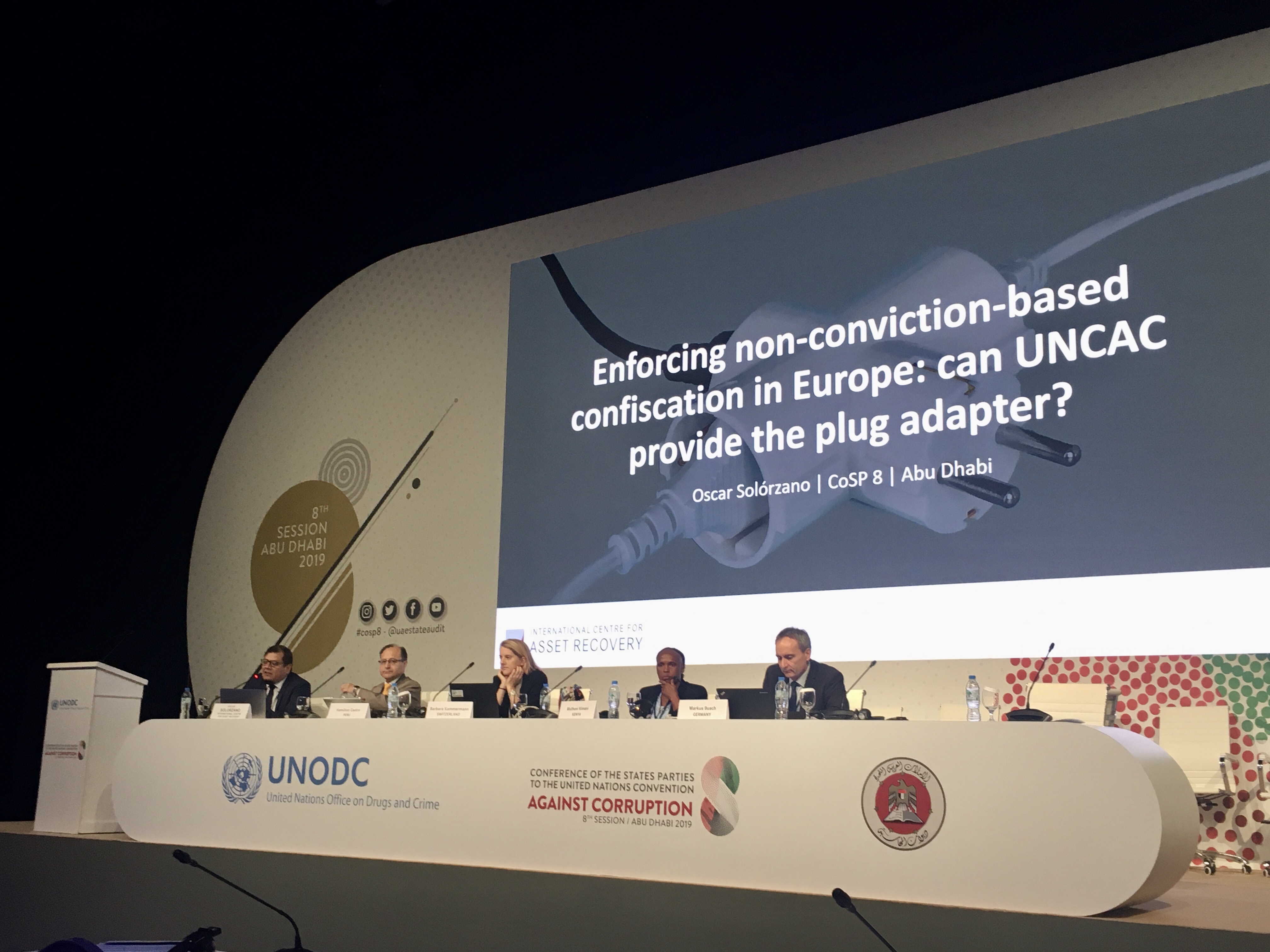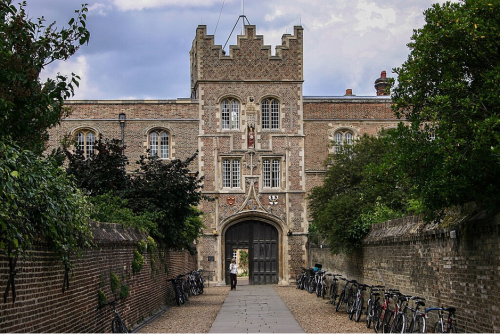The "favourability" principle - UNCAC's plug adapter for enforcement of non-conviction-based confiscation requests

Opening remarks and a presentation of key concepts by Oscar Solórzano at the side event “Living up to the spirit of articles 43 and 46 UNCAC” during the eighth session of the Conference of the States Parties to the United Nations Convention against Corruption, Abu Dhabi, 16-20 December 2019.
Ladies and gentlemen, let me please welcome you to the side event “Living up to the spirit of articles 43 and 46 UNCAC”.
The title suggests that the purpose of this session is to achieve the goals of the Convention, and specifically articles 43 on international cooperation and 46 on mutual legal assistance (MLA). To achieve the goals of the Convention, it is of course important that States Parties initiate legislative revisions where domestic legislation is not up to standard.
We would like to talk about something else, however: using domestic legislation to its full extent, approaching legal challenges presented by asset recovery cases with a mindset of "Yes we can!"
Where possible, law enforcement authorities should do whatever is permitted by their domestic law and practice. This means applying underlying concepts in a constructive manner and - in many settings - changing the way foreign MLA requests are received and executed.
In the asset recovery field, for instance, consider the practices of authorities charged with the execution of foreign requests related to non-conviction-based confiscation (NCBC) actions. Of course, confiscation laws may differ between the two countries. But differences in legal systems alone are not grounds to refuse MLA. Why? Because the UNCAC policymakers envisioned this situation and introduced a favourability principle: States should interpret the provisions of the Convention in a manner that is most favourable to international cooperation in judicial matters. In order to live up to the favourability principle of UNCAC, States do not need new laws, but rather to explore solutions in the existing legal framework.
Favourability does not mean "anything goes". But countries can learn from their peers, and that is what we are hoping to promote this morning. Certain European countries have acquired expertise in enforcing foreign NCBC requests, while acknowledging differences in domestic laws. To prove this, the panel of experts will showcase recent international asset recovery cases between Switzerland and Peru based on NCBC laws.
- I will start by providing the conceptual perspective of the cases from my experience as Senior Asset Recovery Specialist at the Basel Institute’s International Centre for Asset Recovery.
- I will then invite Hamilton Castro, a Peruvian specialised NCBC prosecutor with whom I have worked closely on several important asset recovery cases, to explain through a case presentation why in some scenarios NCBC is the only viable option to recover illicit assets.
- Barbara Kammermann, Legal Officer, Division for Mutual Legal Assistance at the Swiss Federal Office of Justice, will then explain what the challenges in that case were and what legal avenues Switzerland used to enforce the Peruvian NCBC request.
- Finally, two distinguished practitioners, Markus Busch, Head of Division at the Federal Ministry of Justice and Consumer Protection in Germany and Muthoni Kimani, Director of the Asset Recovery Office in Kenya, will react and present their thoughts on "favourable" approaches to NCBC.
Enforcing non-conviction-based confiscation in Europe: can UNCAC provide the plug adapter?
In cases of mutual legal assistance (MLA) in criminal matters, law enforcement authorities are often confronted with a variety of legal provisions potentially applicable to a case. A norm of a bilateral MLA treaty and a norm in domestic MLA law may address the same issue. Choosing the solution that is more favourable to the assistance required is the reasoning behind the “favourability principle”.
A coherent interpretation of such fundamental principle means that a refusal of MLA should be a measure of last resort.
In the UNCAC, favourability is deliberately formulated very broadly so as to enable States Parties to provide MLA to “the widest measure”. One such application of the favourability principle is the granting of MLA when a requesting State seeks to recover illicit assets from a requested State through non-conviction-based confiscation (NCBC).
Objectives of the panel
- Advocate for an interpretation of favourability that promotes NCBC as a valid basis to recover ill-gotten assets.
- Encourage the introduction of the obligation to “sufficiently explain” the decision of the requested State to refuse MLA on the grounds that NCBC is incompatible with its legal framework.
- Pledge for a policy dialogue aiming at revising such a rule or practice so as to meet UNCAC’s standard.
This presentation is divided in three parts:
- I will take a “back to the roots” approach to confiscation.
- I would then like to introduce a discussion of the “supposed affected rights” in NCBC procedures.
- Finally, I would like to convey the lessons learned from international asset recovery efforts involving Peru and Switzerland.
What is confiscation?
During the Middle Ages, confiscation was a widely unpopular measure with the general public as it was often applied for malicious purposes. It was only in the context of the trade in illegal drugs that a wider concept of confiscation was reintroduced: in most countries, confiscation is now considered a reparative measure that only seeks to target illicit wealth. Additional punitive effects and deterrence are not commonplace among the vast majority of States Parties.
According to UNCAC, confiscation is the permanent deprivation of assets by a competent authority. Simply put, proceeds of crime must be taken away in order to ensure that "crime does not pay".
The reparative nature of confiscation has important consequences for its procedural treatment in many countries. In common law jurisdictions, as well as a rising number of European and Latin American countries, confiscation is treated as a “civil” measure closer to the “unjust enrichment” of civil law than to a sanction imposed by a criminal court. A direct consequence of this interpretation is that safeguards of criminal procedure, such as the presumption of innocence, do not apply as as confiscation is not considered an accusation in criminal matters. For that reason, it can be ordered in just but simplified procedures.
In its contemporary interpretation, confiscation is not to be considered a pecuniary sanction. It is certainly neither a civil reparation nor a fine. A civil reparation is based on the concept of harm while a fine is an ordinary criminal sanction.
Confiscation, on the other hand, has its basis in the provenance of the funds derived from the crime. It is said that confiscation in its basic form targets the assets that are the “proceeds” of crime.
As said, most countries in continental Europe share the reparative conception of confiscation. The constant jurisprudence of the European Court of Human Rights (ECHR) assessing the scope of individual European States relating to NCBC is very clear in this regard.
Extinción de dominio
The Peruvian NCBC law, extinción de dominio law (roughly translated as the extinction of possession) follows the same reasoning as the one exposed in the ECHR caselaw. It is directed against the asset and has a reparative nature. Its essential aim is to take assets linked to crimes out of circulation in a special proceeding directed against objects. In any event, it is not intended to punish the perpetrator of the crimes.
The main problem with this point of view is that a pure in rem action - directed against objects - is an alien concept to European civil law countries. This concept, imported from the US legal arsenal, enables the use of a completely different procedure governed by civil standards but granting, however, effective procedural rights to the asset holder in a two-fold judicial process. This is particularly important because one of the main arguments to refuse MLA in NCBC is that it affects fundamental rights.
But what human rights are we talking about? What rights are violated in NCBC? I think it is a valid question that needs special consideration.
Fundamental rights in play
The Peruvian extinción de dominio law grants due process and fundamental rights without restriction. They are in fact fundamental principles of this piece of legislation. The asset holder is granted a large number of procedural rights, including:
- the right to a fair hearing;
- the right to inspect the casefile;
- the right to provide evidence;
- the right to appeal and to a judicial review;
- constitutional courts and international human rights tribunals complete the review possibilities of this action.
The discussion in Europe and Latin America basically revolves around two fundamental rights: the right to property and the protection of procedural guaranties.
Property rights
Latin American States have brought innovative understanding to overcome the difficulties linked to the protection of the right to property: property must have a licit origin to deserve the protection of the State and it must be exercised according to social and public interest as imposed by constitution. The first limitation to property arises therefore from the Constitution itself.
Likewise, property rights are not “absolute” in the sense that they can suffer limitations when confronted with other similar or superior interests. This is the case for instance when the State develops more incisive confiscation rules to protect collective interests, which may have an impact in property rights.
Procedural rights
A persistent argument is that NCBC procedures do not grant, in general, the same procedural rights as criminal confiscation. For some, NCBC tools circumvent the defences of the criminal proceedings and therefore limit the fundamental rights of the defence.
In most cases, indeed, the procedural guaranties are modulated according to the nature of the action: reparative and in rem. As NCBC targets assets, it does not include a general presumption that the assets under investigation are licit, as it is the case in proceedings against persons.
In my view this makes perfectly senses as the asset holder’s freedom is not in play, luckily the ECHR and the majority of constitutional courts follow this idea.
In dubio pro reo (literally “the doubt benefits the offender”) is another of the rights inappropriate in NCBC procedure. The prosecution still supports the burden of proof but if a doubt persists regarding the origin of the asset, it does not benefit the asset holder.
In practice, the burden of proof is lowered to the civil standard of balance of probabilities, which means that the judge decides on the confiscation when he or she thinks that it is more probable that the assets arise from a crime than that they don’t.
What lessons were learned?
NCBC procedures are better placed to recover illicit assets
Several interconnected asset recovery cases in Peru show that NCBC procedures are necessary and adequate in certain scenarios. In these Peruvian cases, the criminals (the beneficial owners of the Swiss accounts) intentionally absconded from Peru upon the initiation of the criminal investigation. As the Peruvian Constitution prohibits in absentia trials, it would have been impossible to confiscate through criminal proceedings as a criminal prosecution cannot take place.
In such scenarios, it is unacceptable to let the criminals knowingly avoid the criminal accusation and enjoy the benefits of their crimes, simply because of old-fashioned legislation or narrow concepts pertaining to confiscation. Favourability must be applied in the Requested State order to overcome such a legal loophole.
Impact on MLA
The success of Peru in these cases heavily relied on the active involvement and support of Swiss authorities. For the cooperation to succeed, the nature of the investigatory or judicial proceeding in the victim country is highly relevant for Switzerland’s ability to cooperate.
It is therefore important to find common grounds of understanding between requesting and requested States and to jointly decide what is feasible and what is not in terms of international MLA.
We believe, the adapter plug, the common language among States, is that confiscation is not punitive but a remedial measure. When States want to use NCBC to punish the perpetrators of crime, it becomes a “penalty” – whereupon criminal safeguards apply without any restrictions. NCBC laws must therefore be limited to assets arising from crimes.
In this respect, Swiss authorities determined that the Peruvian NCBC law complies with Swiss human rights and public order standards. The Swiss Federal Tribunal and the Federal Criminal Court have both confirmed that Switzerland can cooperate with foreign NCBC investigations and is also capable of enforcing the resulting decisions.
Likewise, the European Court of Human Rights, applicable in Switzerland, has repeatedly confirmed that: "[C]ommon European and even universal legal standards can be said to exist which encourage the confiscation of property linked to serious criminal offences such as corruption, money laundering, drug offences and so on, without the prior existence of a criminal conviction".
Ensuring a sound implementation of the specialized asset recovery framework
Asset recovery laws cannot translate into investigations, seizures, confiscations and asset restitutions in the absence of proper specialization and implementation. The extinción de dominio law foresees the progressive implementation of a specialized prosecution and court apparatus, with a nation-wide deployment of 22 courts and 3 courts of appeal devoted to NCBC, each with designated specialized judges, prosecutors and investigative police. The specialization is particularly important as it gives the justice operator, particularly judges, the necessary comprehension and experience to decide on actions which are conceptually disconnected from the criminal trial.




